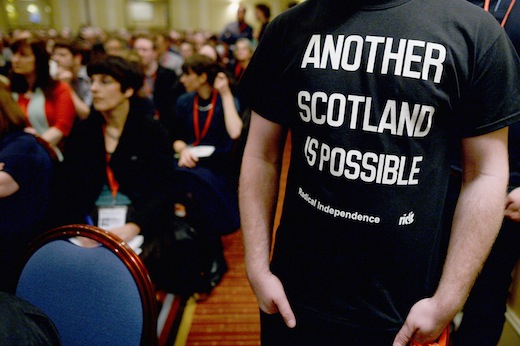Party Fears Too
A few thoughts on the idea of a new political party of the Left and the state of Scottish and British politics in light of discussions over the past few days.
First, the need for a Left socialist party seems compelling given the state of Labour and the social crisis we face. I don’t want an independent Scotland to be forged by the rise of sado-populism and toxic Faragism. The chances of progressive alliances across the UK are far higher, IMHO, if England channels its radical past for a more enlightened future. Second, as Aaron Bastani has written: “Starmerism is disintegrating. That is because, in an age of political fragmentation and economic schism, Starmer sold the public, and his now MPs, on ‘competence’ being all that was needed.” This is self-evident, from Rachel Reeves public breakdown to the Labour rebels now riding roughshod over Starmer’s weird political project.
Second, much of this was badly bungled and incoherent. And, as much as you can wish people well it doesn’t augur well for the future. Much of this is analysed here (below) by Helena ‘No Justice’ (who is coming from a left-green perspective). I agree with much of what she says, in particular; the idea that you can just roll-out Jeremy Corbyn as a ‘left-leader’ and hark back (uncritically) to how wonderful he was. This isn’t really serious politics of intent.
Nor is the idea that you can announce a new party without a press conference and co-ordinated comms, when they could have absolutely made political capital out of Labour’s chaotic week; and finally, although the Greens Zack Polanski’s response was admirable, another condition for a successful launch would have been a pre-agreed Red=Green alliance with the Green Party to avoid splitting the vote.
Third, the project seems equally incoherent about its approach to Scottish independence, or how to operate in Scotland. The Democratic Left Scotland writes:
“There has been some knowledge of preparatory discussions for some time. Sultana’s exit from the Labour Party and internal manoeuvring has quickened the pace of things. The majority of these dynamics are shaped by tactical considerations south of the border. Our view would be that limited consideration of Scotland has taken place in this attempt to get a left of Labour electoral challenge up and running”
“Stagnation within the Scottish Government, ‘a hollowed out Labour Party’ and the rise of the right and Reform are Collective’s stated motivations. Connections with social movements and other groupings on the Scottish left are objectives. A forthcoming conference on October 4th will look forward to the 2026 Holyrood and 2027 local elections.”
They add: “Whilst the autonomy of Collective Scotland’s, as yet, unnamed project has been asserted, clarity on its position on independence or the right for the Scottish Parliament to call for a referendum is yet to fully emerge.”

I’ve also heard that Collective Scotland is definitely the group that is forming the new party in Scotland and also that Collective Scotland is definitely NOT the group that is forming the new party in Scotland. I’ve also been told that the new Scottish party would be for the right of Holyrood to hold a referendum and also that individual members could hold different positions.
The National reported (‘Details emerge of Scottish arm of new Corbyn project’): “The former Labour leader hinted at plans to form a new party earlier this week, suggesting he would be at the helm of a “left independent party of socialist view[s]”.
In fact, Corbyn has studiously avoided being catapulted back into a leadership role he is most obviously unsuited for, and who can blame him?

They continue:
“The day after Corbyn’s announcement, suspended Labour MP Zarah Sultana announced she had quit to join the new party, which she said she would co-lead with Corbyn. Rumours quickly flew around whether or not there would be a Scottish branch of the new party when it is eventually set up.”
This is where further confusion has set in.
“A source told The National that a small group of left-leaning Scots have been working behind the scenes to prepare the Scottish arm ahead of the Holyrood election. However, with the party not yet fully-fledged, how many, if any, candidates it will stand is still up in the air.”
“Collective is a movement which is working to build towards and begin a mass-membership party of the left. It is behind the new party referenced by Sultana, but is not a new party in its own right.”
It all seems a bit shambolic. I say this as someone who would be broadly in favour of emerging new political groupings, provided that they have thought through their political strategies to avoid splitting the vote and made alliances where alliances are crying out to be made.
Others shared these reservations. Richie Venton of the SSP said: “This seems to be a desperate and somewhat belated attempt by Corbyn and Sultana to try and put together an alternative to Starmer’s right-wing Labour. We welcome any move that genuinely tries to present a socialist alternative, and we’re willing to work with anyone who does. However, we have some serious questions about how this new project will operate in Scotland. We’ve seen countless attempts to build left-wing unity in Scotland only to see them fail because of a lack of understanding of the Scottish political landscape and the need for a genuinely independent Scottish socialist movement. Any new party that seeks to operate in Scotland must respect the right of the Scottish people to self-determination and must not be a mere branch office of a London-centric project.”
Ross Greer, MSP, echoed this criticism: “The Scottish Greens have always been clear that we will work with progressive forces across the UK to tackle the climate crisis and inequality. But the idea of a new London-based party trying to establish a ‘branch office’ in Scotland without a clear understanding of our distinct political context is deeply concerning. Scotland needs a strong, independent voice on the left, not another Westminster-controlled outfit. We need real power for the Scottish Parliament to deliver the changes people want to see, and that means independence. Any new party needs to understand that.”
Perhaps the deepest dive into the fortunes and challenges of a new left party in Britain comes from Alfie Steer (The Revenge of the Left), who states:
“Zarah Sultana’s recent announcement that she has resigned from Labour to ‘co-lead the founding of a new party’ with Jeremy Corbyn marks the beginning of probably the most significant left-wing schism from Labour in the party’s post-war history. For all the initial confusion over Corbyn’s involvement, the uncomfortable silence that trailed his own statement, and his rather non-committal claim that ‘discussions are ongoing’, we can probably say that at least some form of political organisation, designed as a left-wing alternative to Labour, will be launched in the coming months.”
He concludes: “Peter Mandelson is once reported to have said that disillusioned left-wing Labour voters simply had ‘nowhere else to go’. But Sultana and Corbyn’s left party may be the biggest challenge to that theory that the Labour Party has ever seen. Despite all the problems that face the new party, it would be the absolute height of complacency for the Labour Party leadership to underestimate it.”
This is true, for all the reservations, qualifications and minefields ahead, the reality is that the Labour Party has been such a massive disappointment to those naive enough to have supported it at the last election, and as such we are in new territory. This has deep and unrecognised consequences for constitutional stability and vastly undermines the case for the Union. But just as the Left is very good (and right) in demanding the case for Scottish independence needs to be re-made, and the reason for past failures critically examined and understood, that is also true of itself. Reinhabiting the old forms with the same old parties and comrades does not seem a dynamic project likely to reach a political breakthrough.

Interesting article. For me the main thing wrong with Corbyn was his total lack of understanding of Scotland, as long as the left recognises Scottish sovereignty then good luck to it. Maybe we will see an independent Scottish Republic, i hope so.
Your final point is spot on, Mike.
We do need a new left party in Scotland, but it needs to be the product of a process of open discussion and engagement with the broad range of forces which should form a part of it, including militant trade unionists, tenants’ unionists and community campaigners, and the most radical parts of the independence, Palestine solidarity, climate justice, LGBT+ rights, disability rights and feminist movements among others.
It is not going to come about by a handful of people, mainly from small, long-established socialist groups (including some, like the SWP, with very troubling histories), coming together covertly and declaring it – though they can certainly make a contribution to that discussion.
I’m concerned that Collective Scotland’s approach – and the forces helping to organise its proposed conference in October – so far seems to resemble the latter far more than the former. It also seems to be quite aloof from whatever is happening south of the border.
Fundamentally, I don’t think there is any realistic prospect of mounting a serious socialist challenge in a Holyrood election which is now less than a year away. I would expect any attempt to end up like RISE in 2016, winning a derisory share of the vote which then contributes to the whole project’s collapse.
It would make a lot more sense to me to spend the next year organising at a local level with a view to getting socialist councillors elected in 2027, who can then taking a leading role in campaigns in defence of working-class communities and against the far-right. The transferable voting system used for local elections also means there’s less risk of vote-splitting allowing right-wing and/or unionist candidates to win.